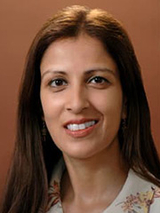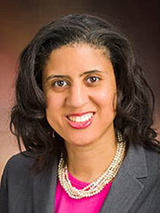Research has long shown minority and low-income children suffer from health disparities that affect the quality of care they receive, the treatments they are offered and their long-term outcomes. These differences have become even more pronounced during the COVID-19 pandemic.
The Division of Gastroenterology, Hepatology and Nutrition at Children’s Hospital of Philadelphia (CHOP) has started and expanded a number of initiatives to attempt to reach children and teens from all races, cultures, backgrounds and socioeconomic statuses. Our goals include:
- Ensuring all children have access to quality healthcare, nutrition and other factors that impact health
- Helping children and families overcome health disparities
- Creating opportunities for children to pursue science, technology, engineering and math (STEM) careers and careers in medicine
Below are just a few projects we’ve started to better meet the needs of our patients and the communities we serve.
Food Pharmacy aids underserved communities

CHOP’s Healthy Weight Food Pharmacy was awarded a $100,000 grant from the GIANT Company to expand the food pharmacy at its current location at 3535 Market St., and build a new Food Pharmacy at the Nicholas and Athena Karabots Primary Care Center in West Philadelphia.
The Food Pharmacy is a service offered by the Healthy Weight Program and was created to focus on food insecurity in the racially and culturally diverse community of West Philadelphia.
“The COVID-19 pandemic has created unprecedented health and economic challenges for our vulnerable populations, right in our backyard,” said Saba Khan, MD, Director of the Healthy Weight Food Pharmacy. “Thanks to our partners at The GIANT Company, we will be able to continue our mission to support families in the West Philadelphia community in a responsive, respectful and effective way.”
Spanish-language nutritional support

Language is a common barrier to nutrition education in non-native English-speaking families. To address this inequity, Elizabeth Parks Prout, MD, MSCE, a board-certified nutrition pediatrician, childhood obesity researcher and Medical Director of the Adolescent Bariatric Surgery Program at CHOP, applied for a CHOP Cares Community Fund Grant to provide linguistically appropriate materials to Spanish-speaking children and families in the Tri-State area.
The CHOP La Comida project will support translating more than 100 pages of current health education materials from the Healthy Weight Program into Spanish for distribution to families within the CHOP Care Network, community partners and local recreation centers. These handouts focus on nutrition, exercise and behavioral changes that families can make to improve their health and delay — or avoid — chronic diseases like obesity and type 2 diabetes.
Anti-inflammatory cookbook
Maria R. Mascarenhas, MBBS, Director of the Integrative Health Program and Section Chief in the Division of Gastroenterology, Hepatology and Nutrition at CHOP, coauthored The Anti-inflammatory Family Cookbook, an easy-to-use and child-friendly guide to 100 anti-inflammatory recipes the whole family can enjoy.
Recipes were chosen from different ethnic and cultural backgrounds so more families might find familiar favorites or new food combinations to meet their dietary needs. Recent studies have found an anti-inflammatory diet may support a children’s focus on schoolwork, increases healthy gut bacteria and microbiome, and decreases symptoms of ADHD and functional GI diseases.
“Our cookbook … combines the best elements of a Mediterranean diet and an Okinawa diet,” said Dr. Mascarenhas. “It includes eating organic foods in season, decreasing the use of processed food and increasing the nutritional content of meals for the entire family. We also talk about how to make baby food from the recipes and how to adjust the recipes for children with food allergies.”
Opportunities for the next generation
Alain J. Benitez, MD, Director of Clinical Research with the Suzi and Scott Lustgarten Center for GI Motility at CHOP, was awarded a grant in June 2020 to promote and support underrepresented minorities in science and healthcare in Philadelphia.
Unfortunately, many minority groups are extremely underrepresented in the medical and research field — possibly due to a lack of robust STEM training and mentoring during early education. Dr. Benitez’s proposal was designed to change that by promoting exposure to science in underrepresented minorities — with the support of faculty from CHOP and the Hospital of the University of Pennsylvania (HUP) — and to provide tools and opportunities for a greater number of minority groups to consider and pursue careers in healthcare and science.
While original plans called for in-person mentoring, programs and experimental learning, COVID-19 forced a change to a web-based platform. Program goals however, remain the same:
- To expose Philadelphia-area students to STEM and medicine education
- To increase their STEM literacy
- Provide students with lifelong mentors
Enterprise-wide commitment to diversity

Our Division’s initiatives underscore CHOP’s hospital-wide commitment to dismantle the barriers to care that many children and families face. In September 2020, CHOP joined 38 health systems across the United States to declare racism as a public health crisis.
“No one individual or institution can do this alone,” said Gilbert Davis, Vice President and Chief Diversity Officer at CHOP. “We are committed to listening to our neighbors of color and implementing initiatives that will help to eradicate all forms of discrimination.”
Investing in communities of color is critical to overcoming health disparities. At CHOP, we are committed to:
- Implementing policy changes that promote equity and opportunity
- Advocating for improvements to health access, quality and outcomes
- Helping our communities overcome chronic diseases
- Advocating for funding for programming for social needs, social services and social justice
Healthier Together
CHOP’s commitment to improve the health of children extends beyond the walls of our hospital and our 60-plus CHOP Care Network locations. Why? Because when it comes to a child’s overall health, medical care only accounts for about 20% of the factors that have an impact. That means that up to 80% of a child’s health is linked to behaviors (like exercise, diet and smoking), socioeconomic factors (income and education) and environmental factors (housing and community safety). Collectively, these nonmedical factors are called the social determinants of health.
Healthier Together, launched in 2019, is CHOP’s initiative to tackle the social determinants of health as a path to improve the overall health of children. We know we can’t do this work alone — Healthier Together partners with community groups, nonprofits and government agencies to learn from each other and further the impact of the work.
We’re dedicating resources to accelerate our impact in the community. Read more about our areas of focus in Healthier Together’s first year-end report.
Promoting mental and behavioral health
The Department of Pediatrics at CHOP awarded the Integrative Health (IH) Program a Diversity Endowment Award to fund community-based wellness education and programs to promote mental and behavioral health for CHOP’s underserved, minority patients.
Integrative Health provides wellness therapies such as yoga, massage, mindfulness, nutrition and physical activity/sleep hygiene to support patients’ and families’ well-being. Studies have shown these types of therapies are effective at reducing anxiety, depression and stress for a variety of conditions, and enhance individuals’ coping strategies, resilience and academic performance.
Similar wellness programs — at CHOP and other institutions — have been well-received by minority and underserved populations. However, mindfulness, yoga and massage, in particular, are not reimbursable by insurance and usually paid out-of-pocket, reducing access for some patients and families. Our new program will make these therapies available — for no charge — to underserved populations who have expressed interest in using these therapies. Our hope is that this program can help break the generational cycle of trauma by teaching families sustainable and natural ways to enhance their mental, behavioral and overall health.
More to come
During the past few years, we’ve made progress in reaching more families where they are, removing barriers, and providing families with the services and supports they need. But there is still much work to do.
CHOP and the Division of Gastroenterology, Hepatology and Nutrition remain committed to pursuing this important work. We truly believe every child deserves a healthy future. It’s up to all of us — pediatricians, specialists, parents and more — to make that happen.
Featured in this article
Specialties & Programs
Research has long shown minority and low-income children suffer from health disparities that affect the quality of care they receive, the treatments they are offered and their long-term outcomes. These differences have become even more pronounced during the COVID-19 pandemic.
The Division of Gastroenterology, Hepatology and Nutrition at Children’s Hospital of Philadelphia (CHOP) has started and expanded a number of initiatives to attempt to reach children and teens from all races, cultures, backgrounds and socioeconomic statuses. Our goals include:
- Ensuring all children have access to quality healthcare, nutrition and other factors that impact health
- Helping children and families overcome health disparities
- Creating opportunities for children to pursue science, technology, engineering and math (STEM) careers and careers in medicine
Below are just a few projects we’ve started to better meet the needs of our patients and the communities we serve.
Food Pharmacy aids underserved communities

CHOP’s Healthy Weight Food Pharmacy was awarded a $100,000 grant from the GIANT Company to expand the food pharmacy at its current location at 3535 Market St., and build a new Food Pharmacy at the Nicholas and Athena Karabots Primary Care Center in West Philadelphia.
The Food Pharmacy is a service offered by the Healthy Weight Program and was created to focus on food insecurity in the racially and culturally diverse community of West Philadelphia.
“The COVID-19 pandemic has created unprecedented health and economic challenges for our vulnerable populations, right in our backyard,” said Saba Khan, MD, Director of the Healthy Weight Food Pharmacy. “Thanks to our partners at The GIANT Company, we will be able to continue our mission to support families in the West Philadelphia community in a responsive, respectful and effective way.”
Spanish-language nutritional support

Language is a common barrier to nutrition education in non-native English-speaking families. To address this inequity, Elizabeth Parks Prout, MD, MSCE, a board-certified nutrition pediatrician, childhood obesity researcher and Medical Director of the Adolescent Bariatric Surgery Program at CHOP, applied for a CHOP Cares Community Fund Grant to provide linguistically appropriate materials to Spanish-speaking children and families in the Tri-State area.
The CHOP La Comida project will support translating more than 100 pages of current health education materials from the Healthy Weight Program into Spanish for distribution to families within the CHOP Care Network, community partners and local recreation centers. These handouts focus on nutrition, exercise and behavioral changes that families can make to improve their health and delay — or avoid — chronic diseases like obesity and type 2 diabetes.
Anti-inflammatory cookbook
Maria R. Mascarenhas, MBBS, Director of the Integrative Health Program and Section Chief in the Division of Gastroenterology, Hepatology and Nutrition at CHOP, coauthored The Anti-inflammatory Family Cookbook, an easy-to-use and child-friendly guide to 100 anti-inflammatory recipes the whole family can enjoy.
Recipes were chosen from different ethnic and cultural backgrounds so more families might find familiar favorites or new food combinations to meet their dietary needs. Recent studies have found an anti-inflammatory diet may support a children’s focus on schoolwork, increases healthy gut bacteria and microbiome, and decreases symptoms of ADHD and functional GI diseases.
“Our cookbook … combines the best elements of a Mediterranean diet and an Okinawa diet,” said Dr. Mascarenhas. “It includes eating organic foods in season, decreasing the use of processed food and increasing the nutritional content of meals for the entire family. We also talk about how to make baby food from the recipes and how to adjust the recipes for children with food allergies.”
Opportunities for the next generation
Alain J. Benitez, MD, Director of Clinical Research with the Suzi and Scott Lustgarten Center for GI Motility at CHOP, was awarded a grant in June 2020 to promote and support underrepresented minorities in science and healthcare in Philadelphia.
Unfortunately, many minority groups are extremely underrepresented in the medical and research field — possibly due to a lack of robust STEM training and mentoring during early education. Dr. Benitez’s proposal was designed to change that by promoting exposure to science in underrepresented minorities — with the support of faculty from CHOP and the Hospital of the University of Pennsylvania (HUP) — and to provide tools and opportunities for a greater number of minority groups to consider and pursue careers in healthcare and science.
While original plans called for in-person mentoring, programs and experimental learning, COVID-19 forced a change to a web-based platform. Program goals however, remain the same:
- To expose Philadelphia-area students to STEM and medicine education
- To increase their STEM literacy
- Provide students with lifelong mentors
Enterprise-wide commitment to diversity

Our Division’s initiatives underscore CHOP’s hospital-wide commitment to dismantle the barriers to care that many children and families face. In September 2020, CHOP joined 38 health systems across the United States to declare racism as a public health crisis.
“No one individual or institution can do this alone,” said Gilbert Davis, Vice President and Chief Diversity Officer at CHOP. “We are committed to listening to our neighbors of color and implementing initiatives that will help to eradicate all forms of discrimination.”
Investing in communities of color is critical to overcoming health disparities. At CHOP, we are committed to:
- Implementing policy changes that promote equity and opportunity
- Advocating for improvements to health access, quality and outcomes
- Helping our communities overcome chronic diseases
- Advocating for funding for programming for social needs, social services and social justice
Healthier Together
CHOP’s commitment to improve the health of children extends beyond the walls of our hospital and our 60-plus CHOP Care Network locations. Why? Because when it comes to a child’s overall health, medical care only accounts for about 20% of the factors that have an impact. That means that up to 80% of a child’s health is linked to behaviors (like exercise, diet and smoking), socioeconomic factors (income and education) and environmental factors (housing and community safety). Collectively, these nonmedical factors are called the social determinants of health.
Healthier Together, launched in 2019, is CHOP’s initiative to tackle the social determinants of health as a path to improve the overall health of children. We know we can’t do this work alone — Healthier Together partners with community groups, nonprofits and government agencies to learn from each other and further the impact of the work.
We’re dedicating resources to accelerate our impact in the community. Read more about our areas of focus in Healthier Together’s first year-end report.
Promoting mental and behavioral health
The Department of Pediatrics at CHOP awarded the Integrative Health (IH) Program a Diversity Endowment Award to fund community-based wellness education and programs to promote mental and behavioral health for CHOP’s underserved, minority patients.
Integrative Health provides wellness therapies such as yoga, massage, mindfulness, nutrition and physical activity/sleep hygiene to support patients’ and families’ well-being. Studies have shown these types of therapies are effective at reducing anxiety, depression and stress for a variety of conditions, and enhance individuals’ coping strategies, resilience and academic performance.
Similar wellness programs — at CHOP and other institutions — have been well-received by minority and underserved populations. However, mindfulness, yoga and massage, in particular, are not reimbursable by insurance and usually paid out-of-pocket, reducing access for some patients and families. Our new program will make these therapies available — for no charge — to underserved populations who have expressed interest in using these therapies. Our hope is that this program can help break the generational cycle of trauma by teaching families sustainable and natural ways to enhance their mental, behavioral and overall health.
More to come
During the past few years, we’ve made progress in reaching more families where they are, removing barriers, and providing families with the services and supports they need. But there is still much work to do.
CHOP and the Division of Gastroenterology, Hepatology and Nutrition remain committed to pursuing this important work. We truly believe every child deserves a healthy future. It’s up to all of us — pediatricians, specialists, parents and more — to make that happen.
Contact us
Division of Gastroenterology, Hepatology and Nutrition